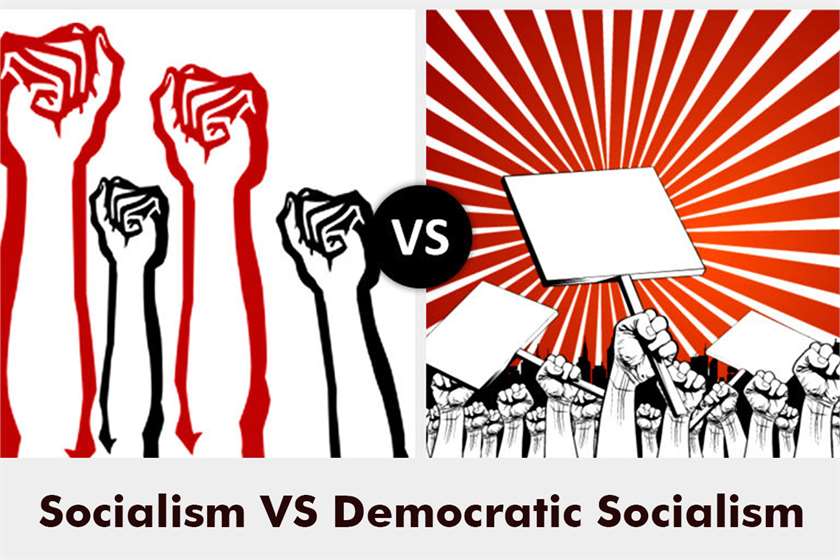We hear the word “socialism” used to refer to advocates of a larger role for government in fostering social wellbeing. While it’s perfectly fine for people to have differing political positions, let’s at least use correct vocabulary. Those being called socialists are really social democrats. Big difference!
Socialism is a system in which most or all of the productive resources, physical capital and land, are owned by the government. And citizens of socialist countries have very little individual freedom. Think Cuba, Venezuela, the late U.S.S.R, and glaringly, North Korea. These are not social democracies; they are oppressive, totalitarian states with no semblance of democracy and provide citizens very poor quality of life. Nobody advocates making the U.S. remotely like any of those countries.
Social democracies are democracies first and foremost but with extensive social programs that promote the general wellbeing by supporting individuals. They provide support for employment, income, retirement, and health care among other aspects of what most people probably think of as features of a good society.
Calling people who favor enhanced social programs socialists is intellectually dishonest at best and mean spirited at worst.
It’s enlightening to compare our situation to conditions in a group of social democracies. My comparison data come from sources such as the OEDC, World Bank, Forbes and U.S. News and World Report, the CATO Institute and one perhaps somewhat less solid source, Wikipedia. Comparison countries are; Canada, Denmark, Finland, Iceland, Ireland, Netherlands, Norway, Sweden, Switzerland, and the United Kingdom. Outcome measures are: GDP per person, healthcare spending per person, healthcare outcomes, personal freedom, quality of democracy, and happiness.
Swiss per person GDP is largest, $82,796, followed by Norway, $81, 678, Ireland, $78,806, Iceland, $73,191, then the U.S., $62,794, fifth richest of the eleven. The lowest per capita GDP is the U.K., $42,943. All measured at Purchasing Power Parity in 2018 dollars.
All of the other ten countries provide their citizens some form of universal healthcare, pay less and get better outcomes than we in the U.S. do. Americans pay $10,224 per person per year compared to the next highest, Switzerland, $8,009. In the nine other countries, per person health care spending is $5,511 (Sweden) or less. However, our healthcare outcomes are not world class. We lag many other developed countries in several meaningful measures of health care outcomes. U.S. News and World Report ranks the top ten countries’ healthcare outcomes. Canada is number one. Also in the top ten are; Denmark, Netherlands, Norway, Sweden, the U.K. and Switzerland.
According to the CATO Institute’s index of personal freedom, all eleven of the countries are among the world’s most free. Switzerland’s 8.82 is tops among the eleven with Iceland’s 8.41 at the bottom. The U.S. at 8.46 is closer to the bottom than the top but the difference between 8.82 and 8.41 is probably not statistically significant. For practical purposes, I’d call that an eleven-way tie.
Wikipedia reports ten of the eleven countries are fully democratic, all except the U.S. Our democracy is called flawed, the category just below fully democratic. Reasonable people could differ about that characterization. However, of the five presidents elected with a minority of the popular vote two of the last three are in that group, George W. Bush and Donald Trump. That fact, along with recent attempts to limit voter participation, suggests calling our democracy flawed is about right.
Happiness? According to Forbes, the happiest place on earth is not Disneyland, or anywhere in the U.S. It’s Finland. Might be all that vodka. The rest of the top five in order are: Denmark, Switzerland, Iceland, and Norway. The U.S. is the eighteenth happiest country.
Why are the Nordic countries so happy? According to the World Happiness Report, the most important source of their happiness is “. . . the quality of institutions, such as reliable and extensive welfare benefits, low corruption, and well-functioning democracy and state institutions.” The report also says citizens of those countries are trusting souls and feel quite free.
In summary, compared to the other ten countries, we are fifth richest, pay much more for health care, are less well insured against health care costs, are less healthy and have no greater freedom. To cap it off we are a bit less democratic than all of them and are less happy than most of them. So why are we afraid of more social in our democracy?
The burden of proof should fall on those who oppose programs such as those social democracies provide their citizens. How is further distancing the U.S. from these countries who are already better off than we going to make ours a better society?
Pat Taylor
Emeritus Associate Professor of Economics
